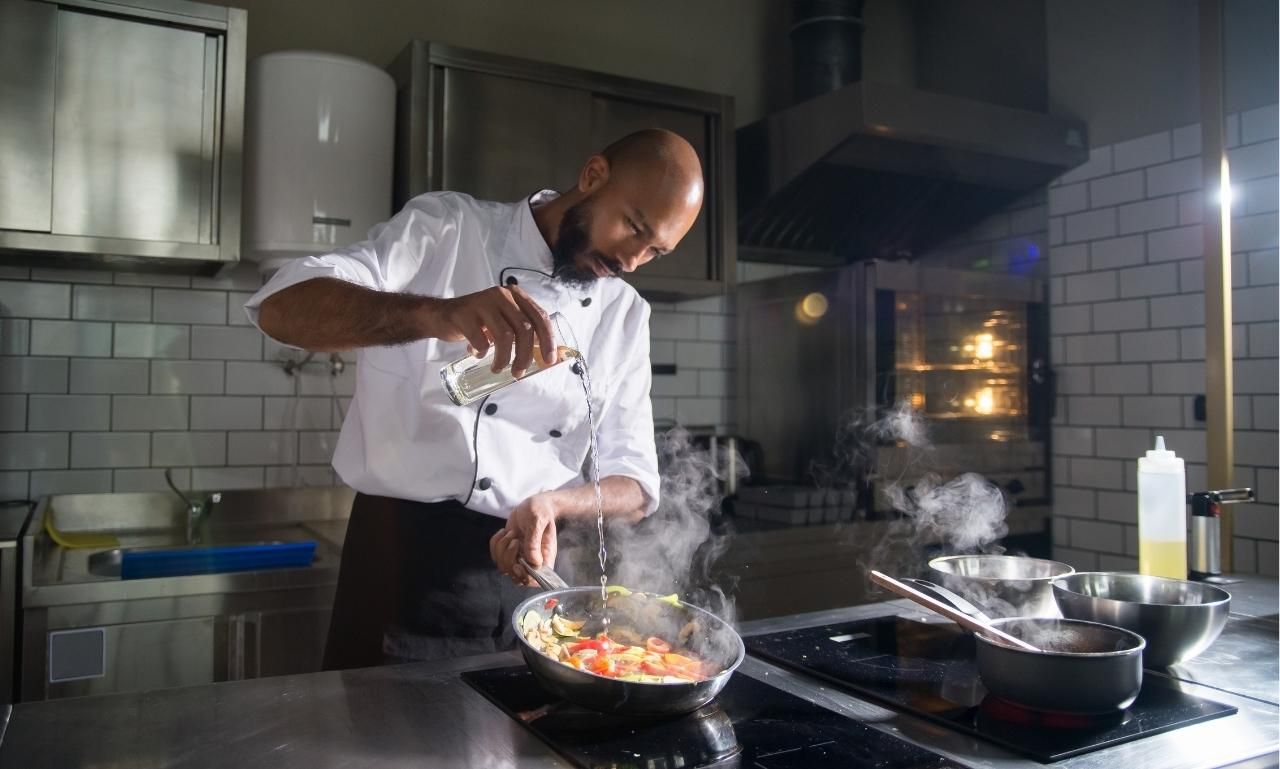The culinary world offers endless opportunities for talented chefs to earn money. Traditional restaurant roles no longer define the limits of a chef's career path. The digital age has created new ways for culinary professionals to showcase their skills.
How to Succeed in Making Money as a Chef
Modern chefs need a combination of culinary expertise and entrepreneurial skills to maximize their earning potential. In today's market, smart business decisions matter as much as perfect knife skills. Your cooking talent can open doors to multiple revenue streams.
The most successful chefs adapt to changing consumer preferences and market demands. They understand both traditional techniques and modern food trends. Professional networking plays a crucial role in building a sustainable culinary career.
8 Ways to Make Money as a Chef
1. Private Chef Services

Private chef services represent one of the most profitable paths in the culinary industry. Top private chefs in major cities earn between $75,000 and $200,000 annually. The market for personalized dining experiences continues to grow.
Successful private chefs build strong relationships with their regular clients. They create custom menus based on dietary preferences and restrictions. Many private chefs work with multiple families to maintain a steady income.
Professional liability insurance protects your private chef business from potential risks. Clear service agreements help prevent misunderstandings with clients. Your reputation for reliability and discretion matters as much as your cooking skills.
Marketing your private chef services requires a strategic approach. Professional websites showcase your experience and specialties, and social media platforms help you reach potential clients in your target market.
2. Culinary Classes and Workshops
Teaching cooking skills provides a stable income while establishing you as an industry expert. Local culinary schools pay experienced instructors $50 to $150 per hour, and community centers and kitchen stores often seek workshop leaders.
Successful cooking instructors develop comprehensive teaching materials and lesson plans. They understand different learning styles and adapt their teaching methods. Many instructors create recipe packets and technique guides for students.
Workshop topics should match local interests and skill levels. Basic knife skills classes attract beginning cooks, while advanced technique workshops appeal to experienced home chefs.
Marketing your classes through local food-related businesses increases visibility. Partnerships with kitchen supply stores create mutual benefits. Your students become ambassadors for your teaching services.
3. Catering Services
Catering businesses combine culinary creativity with significant profit potential. Professional caterers earn $40,000 to $100,000 annually in most markets. Special event catering offers higher profit margins than standard food service.
Starting a catering business requires proper licensing and food safety certification. Commercial kitchen space rental keeps initial costs manageable. Many successful caterers begin with small events and expand gradually.
Menu planning skills help maximize profitability while maintaining quality. Efficient ingredient sourcing reduces food costs. Your pricing structure must cover labor, equipment, and overhead expenses.
Building relationships with event planners creates steady business opportunities. Wedding venues often maintain preferred vendor lists, and corporate clients provide regular income through business events.
4. Recipe Development

Recipe development offers creative freedom and multiple income sources. Food companies pay $500 to $1,000 per tested recipe, and publishing companies seek chef-created recipes for cookbooks and magazines.
Successful recipe developers understand both home cooking and commercial kitchen standards. They test recipes multiple times to ensure reliability. Many recipe developers specialize in specific dietary requirements.
Creating recipes for food manufacturers requires an understanding of industrial processes. Scaling recipes for commercial production presents unique challenges. Your expertise helps companies develop new product lines.
Recipe copyright ownership should be clearly defined in contracts. Some clients want exclusive rights to recipes, while others allow creators to retain partial rights for teaching or publication.
5. Food Blogging
Food blogging combines culinary expertise with content creation skills. Established food blogs generate $5,000 to $25,000 monthly through multiple revenue streams. Your unique perspective attracts dedicated followers.
Successful food bloggers post new content on regular schedules. They understand search engine optimization techniques. Many bloggers create weekly meal plans or cooking technique series.
Photography skills help showcase your recipes effectively. Video content increases engagement on social media. Your personality becomes part of your brand identity.
Monetization strategies include advertising, sponsored posts, and affiliate marketing. Digital products like meal planners generate passive income, and your blog becomes a platform for promoting other services.
6. Pop-up Restaurants
Pop-up restaurants test new concepts with minimal long-term commitment. These events generate $5,000 to $20,000 per weekend in busy locations. Your creativity attracts adventurous diners.
Planning pop-up events requires careful venue selection and timing. Temporary kitchen equipment rental keeps costs manageable. Many pop-ups partner with existing restaurants during off-hours.
Marketing creates excitement through limited availability. Social media campaigns build anticipation. Your unique menu concepts attract media attention.
Successful pop-ups often lead to permanent restaurant opportunities. Investor interest grows with proven concepts, and your track record helps secure future funding.
7. Online Cooking Classes
Digital platforms expand your teaching reach worldwide. Online cooking instructors earn $2,000 to $10,000 monthly through course sales. Your expertise becomes accessible to global audiences.
Creating engaging video content requires proper lighting and sound equipment. Explicit instruction matters more than fancy production values. Many instructors start with smartphone cameras and essential editing software.
Course topics should solve specific cooking challenges. Knife skills courses remain consistently popular. Your specialized knowledge creates unique learning opportunities.
Platform selection affects earning potential and student reach. Some platforms handle marketing and payment processing, while others give creators more control but require more management.
8. Start a Food Truck

Food trucks offer independence and creative control. Successful operators earn $20,000 to $50,000 monthly in high-traffic areas. Your concept must balance uniqueness with broad appeal.
Starting a food truck requires understanding local health regulations. Proper licenses and permits prevent legal issues. Many operators start with used trucks to reduce initial costs.
Location selection impacts daily sales volume. Regular stops build customer loyalty, and your social media updates help customers find you.
Menu planning must consider space and equipment limitations. Prep work organization maximizes efficiency, and your signature dishes become neighborhood favorites.
What Is The Difference Between A Cook And A Chef?
Professional titles reflect different levels of responsibility and expertise. Chefs create menus and manage kitchen operations. Cooks follow established procedures under supervision.
Formal culinary education often distinguishes chefs from cooks—years of experience building management skills. Many successful chefs mentor their staff for career advancement.
Leadership abilities separate chefs from skilled cooks. Kitchen management requires people skills. Your ability to train others reflects professional growth.
What Can Affect A Chef's Salary?
Location
Geographic location influences both salary potential and living costs. Major cities offer more opportunities but higher expenses. Some chefs find better prospects in growing suburban markets.
Regional food preferences affect menu planning and ingredient availability. Seasonal changes impact food costs. Your adaptability helps maintain profitability throughout the year.
Place of Work
Different work environments offer varying compensation packages. High-end restaurants typically provide better benefits, and hotel kitchens offer more stable schedules.
Corporate dining facilities provide regular hours and holidays off. Healthcare facilities need specialized menu planning skills. Your choice of workplace affects your work-life balance.
Education
Formal culinary training opens doors to advanced positions. Prestigious schools provide valuable industry connections. Continuing education keeps skills current with industry trends.
Specialized certifications increase earning potential. Management training develops business skills. Your educational investments pay long-term career dividends.
Experience
Years of professional experience command higher salaries. Specialized expertise creates unique market value. Many chefs develop signature techniques through years of practice.
Leadership experience increases advancement opportunities. Problem-solving skills grow with experience. Your track record proves your professional worth.
Size Of Venue
Larger operations offer more complex responsibilities and compensation. Staff management skills have become increasingly important. Budget control affects overall profitability. Venue size influences menu planning and production volume. Equipment requirements vary with operation size. Your ability to scale operations affects career growth.
Conclusion
Success in the culinary industry requires both cooking talent and business sense. Multiple income streams provide financial stability and growth opportunities, and your professional network supports long-term career development.
Choose revenue streams that match your skills and market demands. Start small and expand based on proven success. Your reputation for quality and reliability builds lasting success.
Also Read: How to Become a Successful Pinterest Manager




